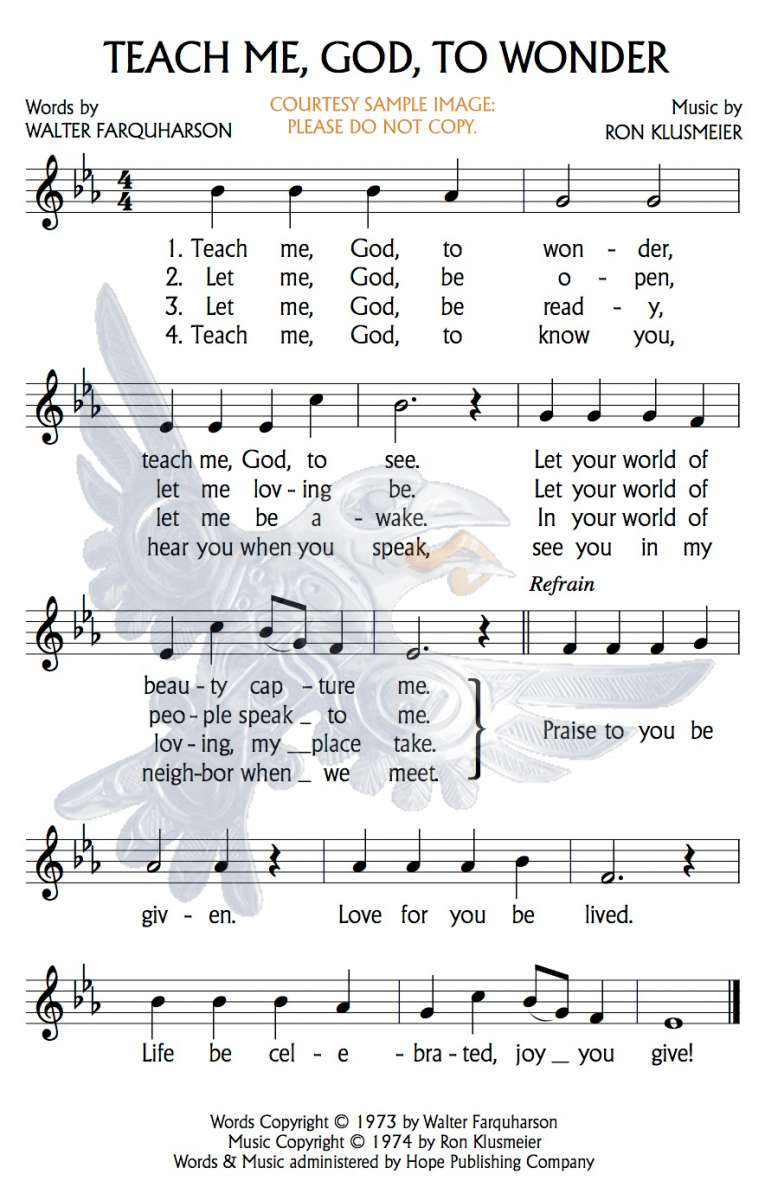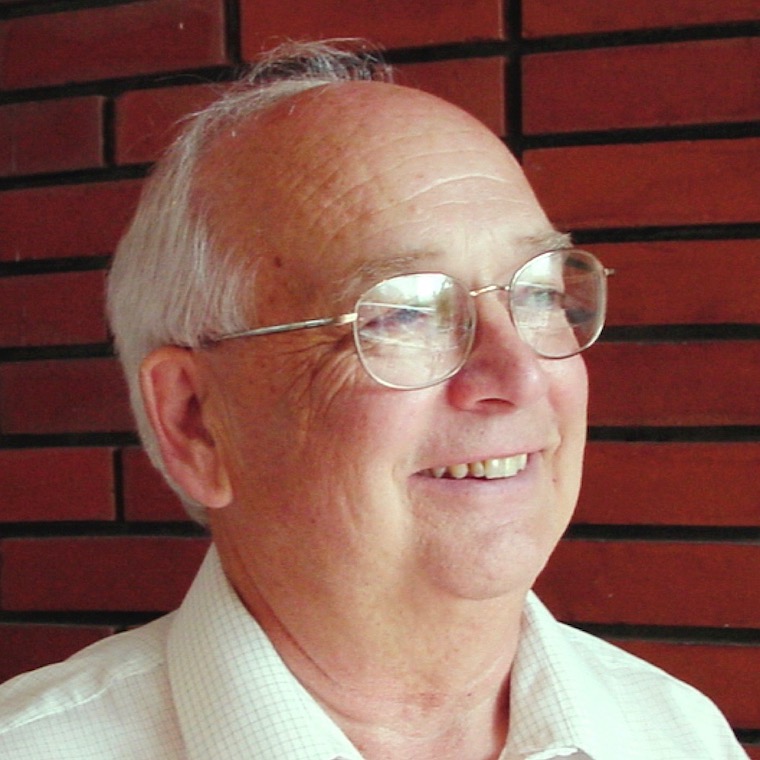Teach Me, God, to Wonder
"'Wonder', as I understand the word,
is the opposite of 'taking for granted'". (wf)
Music by Ron KlusmeierWords by Walter Farquharson
Tune Name: McNAUGHT

Lyrics as Poetry
Teach me, God, to wonder,
teach me, God, to see.
Let your world of beauty capture me.
Praise to you be given.
Love for you be lived.
Life be celebrated, joy you give!
•
Let me, God, be open,
let me loving be.
Let your world of people speak to me.
Praise to you be given.
Love for you be lived.
Life be celebrated, joy you give!
•
Let me, God, be ready,
let me be awake.
In your world of loving, my place take.
Praise to you be given.
Love for you be lived.
Life be celebrated, joy you give!
•
Teach me, God, to know you,
hear you when you speak,
see you in my neighbour when we meet.
Praise to you be given.
Love for you be lived.
Life be celebrated, joy you give!
Words by
Walter FarquharsonCopyright © 1973 by Walter Farquharson
Administered by Hope Publishing Company
Carol Stream, Illinois • USA
Audio Sample for
”Teach Me, God, to Wonder”
One verse played on piano
Scripture References
- Job 38:22-27
- Job 39:1-8
- Job 39:26-28
- Psalm 19:1-4
- Psalm 104:16-21
- Psalm 104:31-34
- Matthew 18:1-5
- Matthew 25:34-40
- Mark 1:14-15
Videos
Teach Me, God, to Wonder
Teach Me, God, to Wonder
Teach Me, God, to Wonder
Season, Theme
or Subject
- Creation∶ gift of
- Discipleship
- Faith
- God∶ nature of
- Intergenerational
- Joy
- Praise
- Prayer
- Service, Serving
- Teacher, Teaching
- Trust
- Witness
- Wonder
Presentation Suggestions
Not yet available for this title. Contact us if you are a subscriber (or purchaser of this title) and need this item.
Projection Images
This feature is only accessible to Subscribers or those who have purchased this Single Title.
Use the link below for instructions on how to use the Projection Images in Powerpoint and Keynote.
Learn moreProjection Images
Available for This Title
16:9 Words Only
16:9 Words With Music
16:9 Words With Images
4:3 Words Only
4:3 Words With Music
4:3 Words With Images
Accompaniment Recordings
This Instrumental Accompaniment Track includes the following:
• One verse Introduction (no refrain)
• One ‘fill’ measure between verses
• Key change between verses 3 & 4
• Melody Guide is a virtual flute (8va)
This feature is only accessible to Subscribers or those who have purchased this Single Title.
-
Subscribe To All Titles
unlimited annual access to everything on this site
-
Purchase
This Title
unlimited access to all versions of this title
-
unlimited access to an individual version of this title
Purchasers and Subscribers
Click links below to download your versions.
Versions Available for This Title
Melody Line Versions (includes transposing instruments)
-
Melody Line: LARGE PRINT
-
Melody Line: 'C' Instrument or Vocal
-
Melody Line: 'C' Instrument 8va
-
Melody Line: Bass Clef 'C' Instrument
-
Melody Line: Alto Clef Instrument
-
Melody Line: ‘Bb’ Instrument
-
Melody Line: ‘Eb’ Instrument
-
Melody Line: ‘F’ Instrument (high)
-
Melody Line: ‘F’ Instrument (low)
Bulletin Masters
-
Bulletin Master: Letter-size 1-up
-
Bulletin Master: Letter-size 2-up
-
Bulletin Master: Legal-size 1-up
-
Bulletin Master: Legal-size 2-up
Hymn-style Vocal Harmonizations (accompany with any piano versions)
-
Hymn-style: SATB voices
-
Hymn-style: SAB voices
-
Hymn-style: 2-part treble voices
-
Hymn-style: 2-part mixed (m/f) voices
Piano Versions
-
Easy Piano: Hymn-style
Guitar Chords & Bass Progressions
-
Guitar & Bass: Full chords in keyboard key
-
Guitar: Transposed capo chords
-
Easy Guitar: Basic chords
Comments About Song
A Reflection by hymnwriter
WALTER FARQUHARSON
“Wonder” as I understand the word is the opposite of “taking for granted”. I believe on the one hand that wonder is a natural response to the world around us and that it is with us, part of us, from the moment we first draw breath. On the other hand, it is also something learned or nurtured by those who are practitioners of the art. Joan and I count ourselves fortunate to have been raised in families, and much influenced by grandparents and others, who loved the world of creation and who celebrated a humanity they knew as diverse, creative, and infinitely interesting.
Wonder is somehow a basal response to that which is beyond us, yet part of us. There is an aspect of something essential and engaging being within us. Yet, there is also an awareness, at some level of our being, that we have approached the mystery within which we exist.
Wonder gives rise to curiosity and a desire to know more, to see more deeply, to identify connections. Wonder gives rise to that which resonates, reverberates, becomes tactile and shapes that part of our knowing that is deep seated in our bodies, our organic reality expressed in skeletal, muscular and nervous systems. We catch our breath, experience a tremor, clap our hands, dance. We may be entranced or ecstatic not because we choose to be, but because we can do no other.
Wonder spurs creativity by activating imagination. It is akin to the world of dream and vision that celebrates what is but also promises or offers, as living possibility, that which could yet be. Song and story, indeed much of that which we know as art and as craft, is midwifed into shapes and forms for sharing and celebrating with others. In turn, the world of art will often move us into new places of wonder and wondering. The poet and the prophet, the composer and the researcher, the healer and the builder of community , by grace, become aware of the of the compulsion and the creativity which wonder urges upon heart, mind and soul.
Jesus reminded his followers and his critics (Mark 12: 28-31) of the first of the commandments, “You shall love the Lord your God with all your heart, and with all your soul, and with all your mind, and with all your strength.” We touch this commandment of engagement in the moment of wonder. The identification of the second commandment as “You shall love your neighbour as yourself,” grows naturally out of the first.
The second verse of “Teach me, God, to wonder” is a movement within the experience of wonder, not a change of subject. We pray to be open and loving, able to see and respect our neighbours as neighbours given us by God. So much of history is the history of division, of seeing others as strangers, aliens, the enemy. Even the biblical history moves in the direction of exclusion and of a sense of God-sanctioned superiority over others. And sadly it has been a story too often relived in the life of the Christian Church.
The creeds and manifestos of division and hatred, of power over others, of seeing others as those to exploit or manipulate are death-dealing. And they are death-dealing ultimately, not only to those who are victims or pawns, but also to those who held such attitudes and proclaimed them as truth and affirmed them as norms for living.
It is often a moment of wonder when we see the humanity of another, especially the humanity of a person or group we had seen as lesser than ourselves. It is often a moment of wonder when we see acts of courage, of selfless love, of sacrifice, of truth-speaking and truth living.
Wonder allows us to see another’s gifts, the richness of their customs or their thought, the struggles that have so profoundly effected their lives. Laughter and tears may lead us into understanding and appreciation or signal that we have been invited into such a space. Reconciliation and peace, justice and mercy, forgiveness and empowerment are marks of a community being healed and ministering such healing to one another and to all within God’s world of loving.
Our oldest son has always loved the outdoors. As a toddler he spent a lot of time exploring in our spacious backyard and garden. There were always things of wonder that caught his attention – a particular flower, a pollen-laden bee, a dragonfly, a bird busy building a nest. One day, in response to the often asked question, “What did you see today, Scott?” he replied, “I was watching the nerfworks.” We had no idea what he was talking about, but in the garden he soon showed us. It was the little circles of earthworm castings that dotted the garden path signalling an abundance of earthworms. We had identified these “earthworm workings” a few days earlier. He had been drawn back to the place of wonder and another study of the nerfworks.
May there be no shortage of nerfworks in our lives!